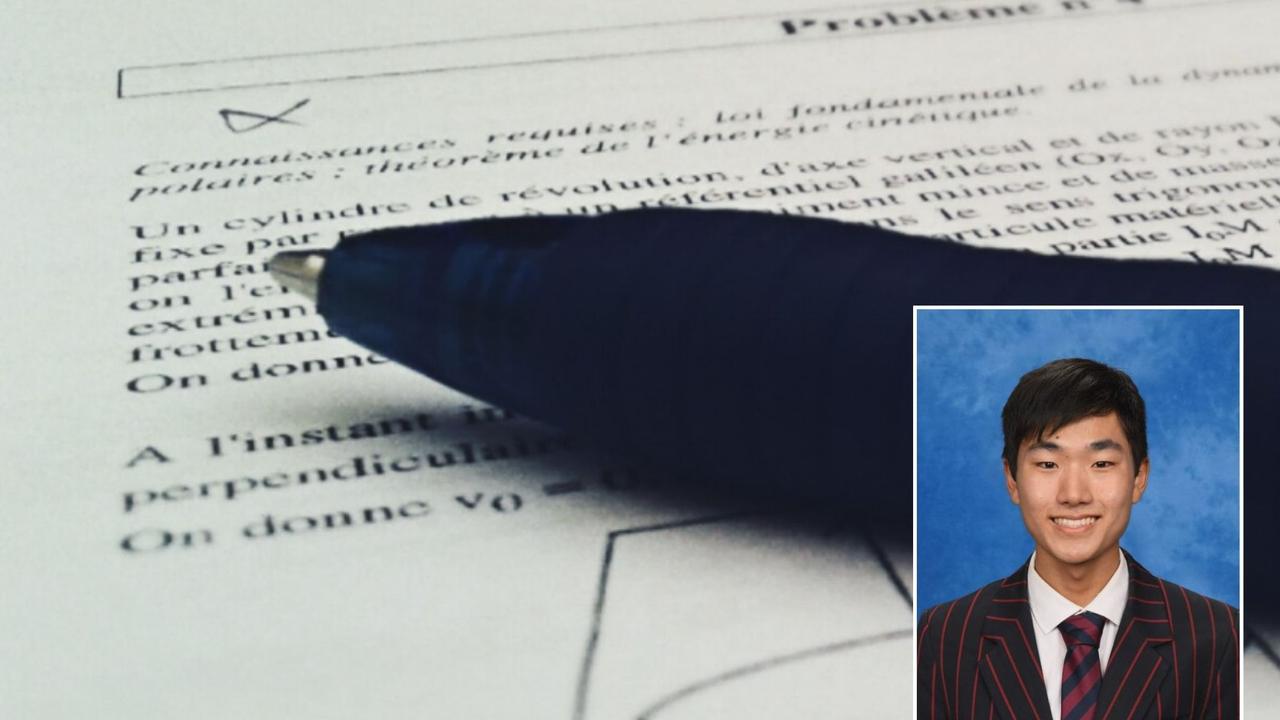QCE 2024: Ultimate guide to smashing the external physics exam
As physics students gear up for not one, but two papers, an education expert and former star student have revealed their last minute guide to tackling the external exams.

Queensland’s year 12 students are well and truly into their final exam block which was kicked off by the huge external English exam.
The end of the first week will not be an easy finish, with physics students gearing up for not one, but two papers on Friday, October 25.
Each paper will be 90 minutes, with 10 minutes of perusal time, and plenty of scientific questions.
It is a mammoth task, but we have enlisted experts to provide their best advice and tips for tackling the external physics exam.
Australian Catholic University Physics educator Dr Wade Naylor said the best thing a student can do when starting their exam is make the most of their perusal time.

“You get 10 minutes of perusal time for each paper. So that will give you a bit of time. You’re not allowed to write on the papers but you can have a look through the questions,” Dr Naylor said.
“Get an idea of the questions that you feel okay about, and the ones you feel will need more time.”
Dr Naylor said allocating strict time limits for each question can help with time management throughout the exam.
“Paper one has multiple choice … it’s 20 multiple choice and then seven or eight short responses,” he explained.
“So hopefully before the exam students have learnt to practice with pace.
“But it might be that you aim to roughly spend one minute per multiple choice question, maybe 90 seconds, for example.
“Some of those multiple choice questions are just recall or factual based on knowledge, as some of them might have some calculation or some amount of calculation or steps, and they can be a little bit more tricky.
“If one of those multiple choice questions is difficult maybe just make a guess, but make a note at the end, if you will have time to go back and check it.”
Dr Naylor said the second paper was bound to have longer, more challenging questions.
“Paper two will say short response questions as well, but typically they are more involved questions. And you do have a few questions which might be just one or two marks, but then you have them as you progress through the paper, you might have eight marks for one question,” he said.
Former Brisbane State High School student Joshua Ryu received an ATAR of 99.80 and 49 out of 50 for his final Physics grade.
The 19-year-old said he stuck to a few tactics as he studied for his exams - one key strategy was “time blocking”.
“As you plan out the day, you divide the day into blocks of time, and each block is dedicated to a specific subject or activity,” he said.
“This is good because actually writing down what to do during the day gives you more accountability for how you spend time each day, and being academically successful involves little daily improvements and consistency.”
When tackling the content-heavy Physics subject, memory techniques were vital.
“I recommend using memory and verbal tricks to remember difficult concepts, which is especially useful in the content-heavy science subjects like Biology, Chemistry or Physics,” he said.
“For all subjects, make sure to capitalise on the past external papers to understand the style of questions.”

Mr Ryu said there was one thing that really challenged me during the Physics exam.
“Complex questions that merged several topics together (e.g., circular motion and electromagnetism) was the main challenge for me,” Mr Ryu said.
The past student said he had to find ways to maintain his motivation as he underwent exams.
“I was definitely stressed throughout the exam period, because I wanted to achieve the best results possible, and I knew that the final examinations could potentially narrow down what I would be eligible to study in university,” Mr Ryu said.
“I remember being extra nervous around a week before the exams started, and also between exams. To navigate the stress, I definitely tried to find ways to keep up the motivation and not lose sight of doing my best on the exams.”
Navigating stress and burnout during exam block from a past student:
Switch between topics and subjects
“When I would sit down to study, there were times when I couldn’t solve a Physics problem or think of ideas for my English essay, but instead of struggling for hours and eventually getting fatigued, I would switch between subjects to keep productive while taking a break from the struggle,” he said.
Have a break or two
“Taking regular breaks was definitely helpful in preventing burnout before the final stages of year 12, which I’d recommend to the class of 2024 as well.
Keep physical ahead of Physics
“I can’t overstate the importance of keeping fit as well – make sure to stay healthy both physically and mentally, and reach out to family and friends if you need to chat about feeling stressed for the exams.
No question is a silly question
“I was fortunate enough to have phenomenal teachers that were always happy to answer my questions, and I’d encourage every year 12 student to do the same and ask whatever questions they may have about the upcoming exams – teachers want you to do well, and there’s nothing to lose from being curious and wanting to clarify things, which is better than not knowing something and getting confused or stressed.”
Physics exam materials
1. Black or blue pens
2. 2B pencils, sharpener and eraser
3. Highlighters — students should not highlight their responses but may highlight stimulus or
questions when permitted by the supervisor
4. A clear plastic ruler
5. water in a clear unlabelled bottle
6. Asthma inhaler.
7. Students may use a clear plastic container or ziplock bag to carry equipment if needed.
Check your calculator
Only calculators approved for use in assessments are permitted. Calculators must be handheld
and solar- or battery powered. Scientific and graphics calculators must:
• Meet the requirements set out in the Scientific calculator list and Graphics calculator list
• Be cleared of memory before entering the assessment room.





